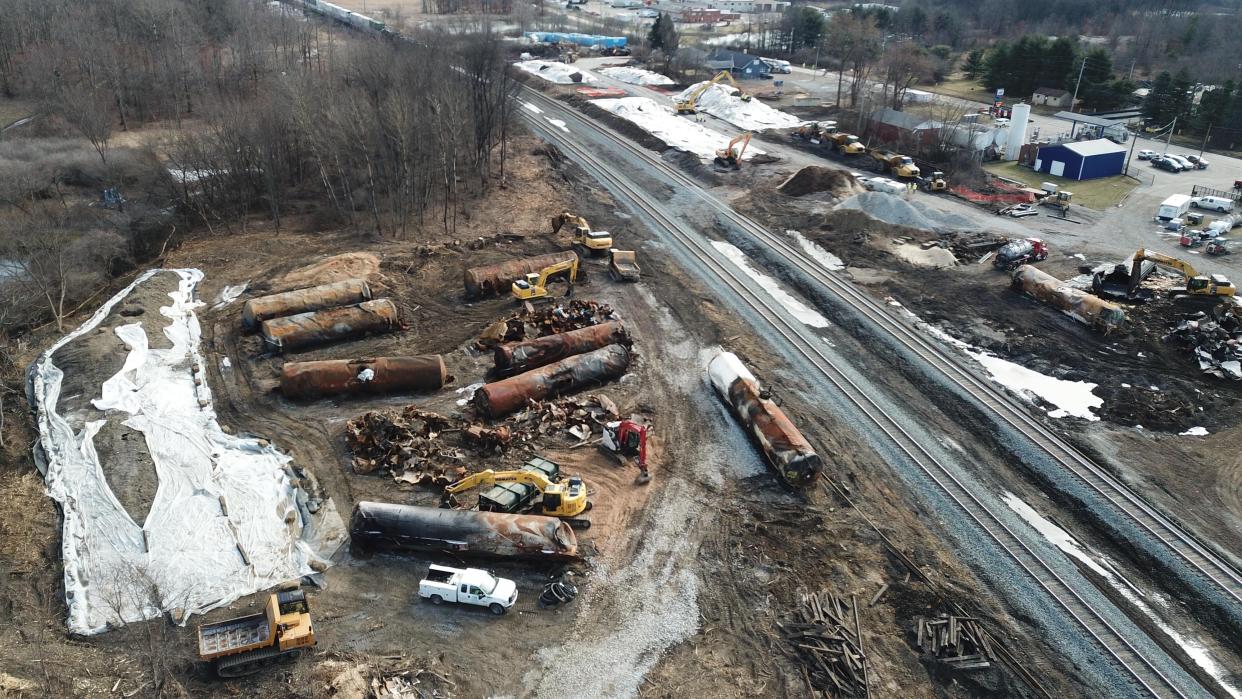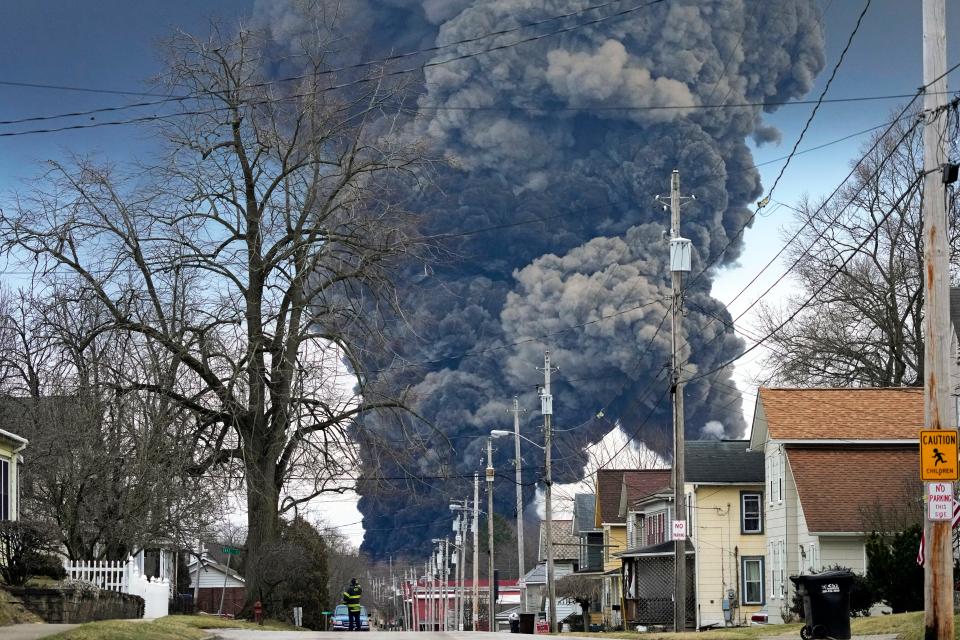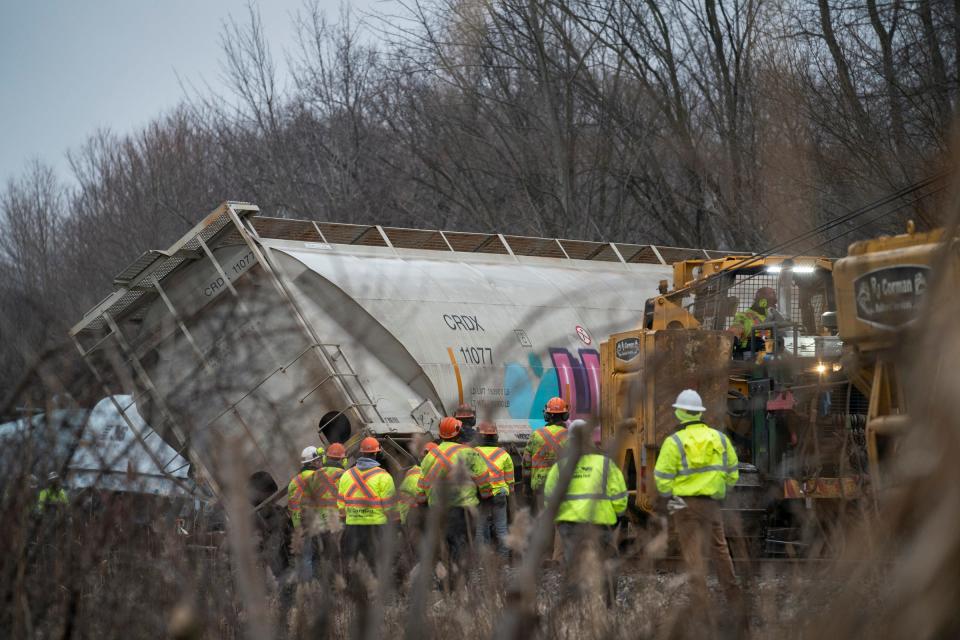Ohio train derailment sends sobering message of environmental risks

UPPER PENINSULA — The environmental catastrophe unfolding in East Palestine, Ohio, begs the question, “Could this happen in our town?”
According to the Department of Transportation, Michigan has over 3,600 miles of rail track, about a third of which is located in the Upper Peninsula. This system carries 17 percent of the state’s freight tonnage and 21 percent of the commodities by value.
Four of the seven Class I railroad corporations operate in Michigan, including Norfolk Southern, the company responsible for the 38-rail car derailment on Feb. 3 in East Palestine, Ohio.
But what is transported on Michigan’s railroads? According to one source, basically everything.
On any given day, a Michigan train might carry agricultural products, iron ore, timber, coal, coke, chlorine, flammable gasses, hazardous chemicals, home building materials, finished automobiles and household appliances. Most products could be salvaged in the event of a derailment. But not all. Just one derailment involving hazardous chemicals could create an environmental catastrophe for nearby residents.

Twenty of the 150 freight cars on the Norfolk Southern train in East Palestine carried the following hazardous chemicals:
Isobutylene
Butyl acrylate
Ethylene glycol
Benzene residue
Monobutyl ether
Combustible liquids
2-ethylhexyl acrylate
Chloroethene (vinyl chloride)
Of the 38 cars that derailed, 11 were tank cars that dumped about 100,000 gallons of hazardous materials, including vinyl chloride, benzene residue and butyl acrylate. Derailed railcars burned for two days following the crash, with emergency responders performing a “controlled burn” to release hydrogen chloride and phosgene into the air. All residents within a one-mile radius were evacuated.
According to the Ohio Department of Natural Resources, the derailment killed more than 43,000 fish, crustaceans, amphibians and other marine animals to date. Ohioans 10 miles from the derailment have reported pets and farm animals dying overnight. East Palestine residents have complained of headaches, coughing, fatigue, irritation, pain and burning sensations on their skin.
What were the circumstances that led to the East Palestine derailment? In 2018, the United States Department of Transportation repealed critical regulations requiring electronic brake systems for trains carrying hazardous and flammable material.
Had lobbyist-led deregulation efforts been blocked and had electronic brakes been in place as intended, the East Palestine derailment could have been prevented or at least minimized. Yet the 2018 deregulation is just one of many concessions to Norfolk Southern and other rail giants in recent years, concessions which critics say empower rail companies to have fewer staff on their trains, fewer inspections, less maintenance and increasingly outdated safety precautions.
“In the wake of East Palestine, we renewed our 2018 challenge to the DOT’s repeal of regulations for trains carrying hazardous materials. What happened is the direct result of the industry regulating itself,” said Christy McGillivray, legislative and political director of the Michigan Sierra Club.
“I’m sure you saw the reporting that the contaminated soil from East Palestine was headed to Michigan, to the same Michigan community where a Norfolk Southern train derailed just days after the Ohio disaster. There is woefully inadequate public notice and oversight in transporting and disposing hazardous waste. The result is that preventable disasters like the one in Ohio become the cost of doing business.”
Michigan residents face two critical questions in light of the East Palestine crisis:
1. Will one of our towns be the next to make national headlines for an environmental disaster?
2. What say do Michigan residents have when the same corporations responsible for environmental catastrophes send toxic waste over the state border for disposal?
After a Norfolk Southern train derailed in Van Buren Township in southern Michigan on Feb. 16, the Department of Environment, Great Lakes, and Energy confirmed no hazardous material was released into soil or waterways. However, one railcar contained liquid chlorine but was away from the overturned section.

“At this time, no one is aware of the release of any hazardous materials,” said U.S. Rep. Debbie Dingell (D-Ann Arbor). “It (the freight car carrying liquid chlorine) is being removed from the area of the other derailed cars, and EPA is dispatching a team to ensure public safety.”
Regarding the second question, parts of Norfolk Southern’s attempt to send toxic soil from East Palestine to Michigan were temporarily blocked. According to a statement from EGLE, “Hazardous waste shipments had been halted by the Environmental Protection Agency following demands from Michigan state and local officials that the shipments be paused.”
However, EGLE was informed after the fact that some liquid waste from East Palestine had already been disposed of at an injection well in Romulus. Injection wells are often used to dispose of hazardous material by injecting fluid into porous geological formations underground. Michigan residents gathered in Romulus on Feb. 26 to protest the arrival of toxic waste.
Despite the series of derailments and chemical contamination, state officials also urged residents to remember railroads serve an important role across the state. There are nearly 3,400 freight rail jobs in Michigan and 90 million tons of essential cargo is transported via freight rail in the state each year.
“Rail has long played a role in moving Michigan’s auto industry, from the early 1900s and Henry Ford’s Highland Park assembly plant to today,” said Dan Papineau, the director of tax policy and regulatory affairs at the Michigan Chamber of Commerce Freight.
“Trains today move 75 percent of the over 17 million new cars and light trucks purchased in the United States. More than this, they’re involved in every stage of auto manufacturing, from hauling the raw iron ore and coke for steel to delivering finished auto parts. This amounted to 1.8 million rail carloads of vehicles and parts in 2018.”
However, critics also argue that rail is only beneficial to Michiganders if the lines are operated in a safe, ethical manner.
Subscribe:Get unlimited access to our coverage
“The real solution here is to stop making toxic chemicals that cannot be transported or disposed of safely,” said McGillivray. “Regardless of appropriate notice and oversight, the end result is that shareholders profit while we are left choosing which community we are going to sacrifice to cancer-causing chemicals.”
Ren Brabenec is a Brimley-based freelance writer and journalist with The Sault News. He reports on politics, local issues, environmental stories and the economy. For questions, comments, or to suggest a story, email hello@renbrabenec.com.
This article originally appeared on The Sault News: Ohio train derailment sends sobering message of environmental risks

